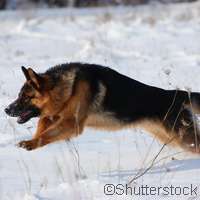Study spotlights dog impulsivity

Researchers in Hungary have discovered a clear link between repeat polymorphism in the tyrosine hydroxylase (TH) gene with activity-impulsivity in German Shepherd dogs. The research is presented in the journal PLoS ONE.
Because similar evolutionary processes helped shape human and canine behaviours, researchers often choose dogs in their efforts to show a complex level of similarity with humans in a set of functionally shared behavioral features. Scientists who wish to investigate the genetic background of complex human behavioural diseases also benefit from dog assessments. The German Shepherd is a popular dog breed: it is known for its 'working' capabilities; used as a guide dog for the blind as well a police dog; and for guarding and protecting. But it is also a great pet dog.
Experts believe that human impulsivity is the opposite of conscientiousness, which centres on impulse control, self-discipline and dutifulness. When it comes to dogs, these facets are related to 'responsiveness to training', evaluated by several activities including object retrieval. Dogs, however, have never been directly tested for impulsivity... until now. In this latest study, researchers from Eötvös Loránd University and Semmelweis University in Hungary developed a valid and reliable test battery for measuring activity and impulsivity in dogs. The team also identified one of the underlying genetic factors of complex traits.
The team assessed the behaviour of 104 dogs, characterised by 2 instruments. The first tool was the previously validated 'Dog-attention deficit hyperactivity disorder rating scale' (Dog-ADHD RS) and the second was the newly developed 'Activity-impulsivity behavioral scale' (AIBS). The second tool included four subtests, and it tested for internal consistency, inter-observer reliability, test-retest reliability and convergent validity.
"We investigated whether the activity-impulsivity trait in dogs measured by owners' reports (Dog-ADHD RS) and behavior tests are affected by a recently reported TH intron 4 repeat polymorphism," the authors of the study write. "In this repeat polymorphism, a 36-bp-long sequence in the intron 4 region of the TH gene is reiterated once (duplicated) or not reiterated at all."
The researchers say their study offers new insight into a popular working and pet dog breed. The findings also provide a new tool for diagnosing canine hyperactivity. In their paper, the authors write: "The present results also have some potential to support human studies; however, further studies should examine other personality traits involved in the activity-impulsivity of dogs, and the links with human ADHD."
More information: Kubinyi, E. et al. 'Polymorphism in the Tyrosine Hydroxylase (TH) Gene Is Associated with Activity-Impulsivity in German Shepherd Dogs', PLoS ONE, 7(1): e30271, 2012. doi:10.1371/journal.pone.0030271
Journal information: PLoS ONE
Provided by CORDIS















